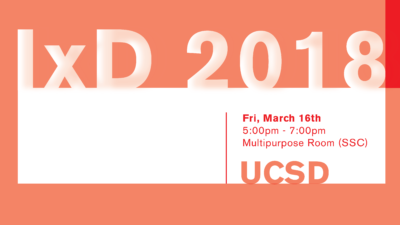
Wednesday, February 14, 2018 at 4:00 p.m.
CSE 1202 on the UCSD campus
Abstract:
Networks for us, by us: Participatory design for a San Diego Digital Commons
It’s often taken for granted that, besides the occasional request to fill out a survey, everyday users should have little say in the design or governance of the digital networks and platforms used to produce and exchange information, such as provided by Google, Facebook, and Twitter. Given this lack of user participation, along with the general opacity of the deep algorithmic design structure to the average user, it can be difficult to fully appreciate the varying social, political, and intellectual effects of different types of digital tools or imagine how they might be otherwise. While there is growing public concern over some of the dystopian aspects of our digital networks (such as “algorithmic control” and “dataveillance”), there is still broad uncertainty about how to develop and sustain networked digital tools in line with democratic ideals.
In this talk, I will describe counter models of technological development that seek to expand user participation in the design, development, and governance of their tools. Through an overview of relevant case studies, such as the participatory design movement beginning in the 1960s, the free and open source development communities beginning in the 1980s, digital humanities/pedagogy experiments in the early 21st century, and the Platform Cooperative movement today, I will give concrete examples of how participatory design offers exciting opportunities to better shape the social, political, and intellectual outcomes of our networked communication. I will then describe KNIT, a digital commons for the San Diego academic community and its vision to incorporate student participation in its development and governance. If time remains, we will end with a short collaborative brainstorming exercise to imagine the networked tools we would build to support the type of academic community we want.
Bio:
Erin Rose Glass is the Digital Humanities Coordinator at the UC San Diego Library and a Ph.D. Candidate at The CUNY Graduate Center. Her dissertation, Software of the Oppressed: Reprogramming the Invisible Discipline, examines the politics and history of digital technology at the often overlooked site of academic and student writing and explores emerging opportunities for the humanities to shape everyday digital technologies. She is the co-founder of Social Paper, a platform for socializing student writing and feedback funded by the NEH and serves as the digital pedagogy designer for the Mellon-funded collaboration between UC San Diego and the San Diego Community College District (SDCCD). She has published on the intellectual and political stakes of digital infrastructure related to libraries, education, and digital humanities program building and currently directs KNIT, a digital commons shared between UC San Diego and SDCCD. She is a founding co-organizer and instructor of the Association of Research Libraries Digital Scholarship Institute and serves on the editorial advisory board of the Public Philosophy Journal. Erin also formerly served as Associate Director of Digital Arts & Humanities Initiatives and Associate Director of the Center for the Humanities at UC San Diego.
Wednesday, April 4, 2018 at 4:00 P.M.
CSE 1202 on the UCSD campus
Video will be posted 2 weeks after talk date
Abstract:
Ethical issues in Cybersecurity Research
Computer security is a field that is fundamentally co-dependent — an interplay between the potential risk created by technology and the actual threats created by adversaries. The dance between defenders, technologists and attackers is one that is rich and dynamic and fuels both a large active research community and a multi-billion dollar computer security industry. Inevitably, ethical issues are exposed at multiple levels of this stack — frequently at precisely those points where consequences are not well understood. In this talk, I’ll describe some of the ethical issues I’ve encountered in my own work — ranging from measurement studies of cybercrime to identifying security vulnerabilities in automobiles — and explore how these issues have challenged and focused us. Expect more questions than answers.
Bio:
Stefan Savage is a professor of Computer Science and Engineering at the University of California, San Diego. He received his Ph.D. in Computer Science and Engineering from the University of Washington and a B.S. in Applied History from Carnegie Mellon University. Savage is a full-time empiricist, whose research interests lie at the intersection of computer security, distributed systems and networking. He currently serves as co-director of UCSD’s Center for Network Systems (CNS) and for the Center for Evidence based Security Research (CESR). Savage is a MacArthur Fellow, a Sloan Fellow, an ACM Fellow, and is a recipient of the ACM Prize in Computing and the ACM SIGOPS Weiser Award. He currently holds the Irwin and Joan Jacobs Chair in Information and Computer Science, but is a fairly down-to-earth guy and only writes about himself in the third person when asked.
Wednesday, April 4, 2018 at 4:00 P.M.
CSE 1202 on the UCSD campus
https://goo.gl/PJiRhJ (Google Map Link)


